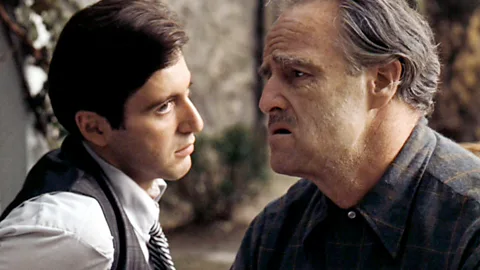Francis Ford Coppola on how The Godfather was a stark warning for the US
 Getty Images
Getty ImagesIn these exclusive BBC Archive interviews, Francis Ford Coppola describes how with his masterpiece The Godfather he visualised the intricate web of influence, manipulation and violence that underpinned the world of organised crime – and showed how it reflected the US.
On 14 March 1972, the iconic crime epic The Godfather premiered in New York. With its haunting score, its subtle, evocative cinematography, its endlessly quotable dialogue and its powerhouse performances – which served to revive Marlon Brando's career and make a star of a young Al Pacino – it is now widely regarded as one of the greatest films of all time.
Accused of glamorising crime and the Mafia before it was even released, it went on to be seen by many as the definitive gangster film. But not by its director. "I've always felt The Godfather was really less about gangsters, than about power and powerful families, and the succession of power, and the Machiavellian way that real power works in the world," Francis Ford Coppola told the BBC's Barry Norman in 1991.
Coppola was just 29 years old when he was first offered the chance to direct an adaptation of Mario Puzo's bestselling 1969 novel. The story centred on a fictional New York Mafia family in the post-World War Two years, led by patriarch Don Vito Corleone (the eponymous Godfather of the title), as they try to ensure their survival in the brutal and treacherous world of organised crime. When the Don is betrayed, his youngest son Michael, who had hoped for a life away from the Mob, gets pulled into the family business, as a war between the different crime families breaks out and they fight for control.
Coppola initially did not warm to the book. He wasn't much interested in the Mafia, and when he first read it, he was put off by some of its more lurid aspects.
"To me originally, and anyone who re the original Godfather book, it had a lot of sleazy aspects to it, which of course were cut out for the movie, and I didn't like it very much for those reasons," he told Sir Christopher Frayling in a 1985 BBC interview.
But being from an Italian-American background like its author Puzo, he did understand the culture, tradition and family rituals the story was steeped in. And, as he reread the book, he saw there was much more to it than just a potboiler about crime, sex and revenge. The story had themes that were classical in their nature, a powerful father and family bonds, a son yearning to escape his fate, old-world values clashing with a changing society, honour and betrayal, and how power corrupts the souls of those who wield it.
More like this:
- Why The Godfather Part III has been unfairly demonised
"Obviously I was more interested in those themes but those themes could apply to a Shakespeare play, or any piece that deals, you know, Greek drama even really, that deals with those bigger themes, and that's more where I had my attention on," Coppola told Barry Norman.
He and Puzo drew out these themes as they worked together on the screenplay. Coppola told the BBC that at the heart of the film lies an examination of power dynamics, the corrupting influence of powerful families and a commentary on the way the US operates on the world stage.
Parallels with the US
The first film's timeline, which spans from the 1940s to the 1950s, coincides with an era where the US is emerging from the ashes of World War Two, and becoming a dominant force on the global stage. The Corleones, a family bonded not just by blood but by their immigrant background, represent an America that is both insular looking and ruthless in its application of force and influence in its own self-interest.
In the film, Don Corleone (played by Marlon Brando) will, depending on the situation, negotiate, bribe, intimidate or resort to savage violence to ensure that his family's interests and power are maintained. Likewise, the US, faced with what it saw as the threat of the Soviet Union, was being accused of using clandestine operations or bribery to destabilise rival countries, forming alliances with other nations, promising them its protection and fighting proxy wars in other countries, to ensure US interests prevailed.
In History
In History is a series which uses the BBC's unique audio and video archive to explore historical events that still resonate today. window._taboola = window._taboola || []; _taboola.push({ mode: 'alternating-thumbnails-a', container: 'taboola-below-article', placement: 'Below Article', target_type: 'mix' });
